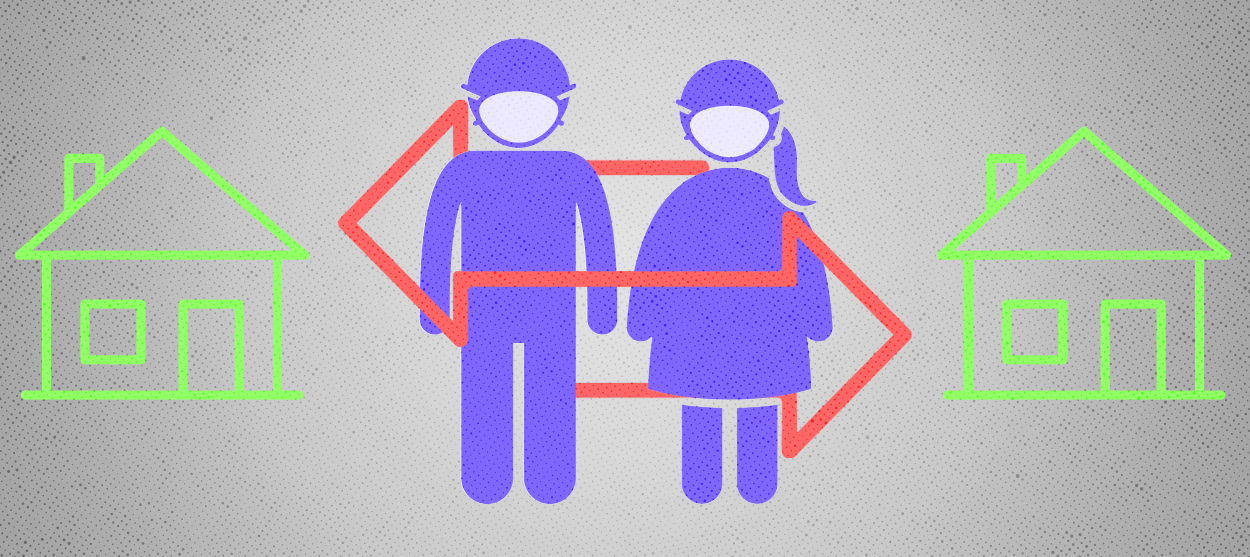Can parents still share custody during the pandemic?
Is it safe to keep co-parenting during coronavirus?


A free daily email with the biggest news stories of the day – and the best features from TheWeek.com
You are now subscribed
Your newsletter sign-up was successful
Three months ago, my ex-husband and I had a (particularly ridiculous, with hindsight) fallout over our children's socks. Yes, socks. I buy them, he loses them. I was sick of sending our kids to him in matching pairs and then getting them back in mismatched ones, or without any socks at all. I nearly accused him of stockpiling socks under his bed as some sort of delayed revenge for me ending our relationship, but I resisted. What can I say — co-parenting with an ex can drive you to some crazy thoughts.
Of course, with the coronavirus pandemic raging, socks are the least of my worries right now. What matters to me most is keeping my kids healthy — physically, mentally, and emotionally. Which is why, in the face of enormous uncertainty and widespread confusion and fear, my ex and I have decided to continue with our existing co-parenting plan: The children spend four nights a week with me and three with their dad. This might seem to COVID-19 purists to be a breach of strict stay-at-home orders, but many experts (and fellow parents) agree that for kids already splitting their time between parents, sticking with the co-parenting schedule is the right thing to do.
"Keeping your parenting schedule at this time is critical," says licensed clinical psychologist and parenting evaluator Melanie English, Ph.D. "Routine and structure with school, friends, sports, and extracurricular activities has been halted. ... Children need the consistency and that will help them feel like part of their world is still safe and in control."
The Week
Escape your echo chamber. Get the facts behind the news, plus analysis from multiple perspectives.

Sign up for The Week's Free Newsletters
From our morning news briefing to a weekly Good News Newsletter, get the best of The Week delivered directly to your inbox.
From our morning news briefing to a weekly Good News Newsletter, get the best of The Week delivered directly to your inbox.
One crucial qualifier in our coronavirus co-parenting arrangement: It is subject to change if any of us developed COVID-19 symptoms. So if I were to get sick while the kids were with me, for example, we'd all isolate in my home for at least 14 days. Of course, we're vigilant about social distancing and hygiene measures. The kids don't take anything between the two homes apart from the clothes on their backs and one device each. When they get back from their dad's place, their shoes go in a box at the door, their clothes go straight into the washing machine, and they wash their hands before they touch anything — door handles, their baby sister, me.
Basically, we're following the rules while still letting our kids spend their usual amount of time with both parents. And there really wasn't much discussion about it. I know other parents are doing things a little differently. Some are keeping the kids with their primary carer and facilitating contact with the other parent through phone calls and FaceTime. But this just didn't feel right to us. We have something very close to a 50/50 arrangement, and I don't feel I have the right to call the shots just because I'm the mother. Even if I do buy all the socks.
There's also the kids' emotional needs to consider. How might they respond to having their time with one parent suddenly limited? "When a young child doesn't see one parent for an extended period of time, they can develop feelings of abandonment or even develop pathological attachment styles that they carry into their adult relationships," says board certified psychiatrist Margaret Seide, MD.
This could manifest into an avoidant attachment style, where a grown child is reluctant to get close to other people for fear of being abandoned. Or they may go the opposite way, taking on a heightened sense of attachment or an anxious attachment style.
A free daily email with the biggest news stories of the day – and the best features from TheWeek.com
"Young kids may interpret the absence of a parent as something that is their fault and believe that their behavior is somehow responsible for the lack of contact," Dr. Seide says. "That's why it's so important to maintain a level of normalcy, even under these dire circumstances."
If you're finding co-parenting difficult right now, Dr. Seide has some suggestions. First of all, consistency is key. To maintain it, lay the ground rules early and make sure your co-parent understands them. "This should be based on safety and the emotional needs of your child," she says. "Make sure your framework limits the amount of transfers and minimize exposure to the virus, while maintaining the closest level of normalcy possible."
It's also important to come to an agreement on how to discuss world events with your kids to avoid adding to their confusion during an already unsettling time. "If one parent tends to be sheltering the child from information and says 'everything is okay' and the other is constantly watching COVID-19 news with the child in the background, that's not ideal," Dr. Seide days. "Adults should agree on what their child is exposed to and how they are going to explain to them what is going on in an age-appropriate way."
I'm not going to lie: While our kids' safety and well-being are our first priority in all this, I have also benefited from our decision to stick with our regular co-parenting plan. I can keep working my usual 40-plus hour weeks when I don't have a house full of kids 24/7. Yes, of course I miss my kids every second they're away. But having a break from them lets me get my work done and take some time for myself to recharge.
That may sound selfish, but Dr. Seide agrees that safely splitting time between parents isn't only good for the child's well-being. "It's important for the parent's welfare," she says. "If one parent is the primary caregiver who is facilitating home-schooling, preparing meals, etc., they may need a break from childcare for their own emotional health."
For more practical advice on co-parenting during lockdown, Dr. English recommends reading the recent guidelines prepared by the Association of Family and Conciliation Court and the American Academy of Matrimonial Lawyers.
Most importantly, don't beat yourself up if co-parenting isn't going as smoothly as you'd like right now. "With or without a pandemic, sometimes there are problems or issues that impact co-parenting, and your ex-partner may not be your favorite person," Dr. English says. Just try to keep things as consistent as possible, and remember: This won't last forever.
Want more essential commentary and analysis like this delivered straight to your inbox? Sign up for The Week's "Today's best articles" newsletter here.
Claire Gillespie is a freelance writer with bylines on Health, SELF, Refinery29, Glamour, The Washington Post, and many more. She likes to write about parenting, health, and culture. She lives in Scotland with her husband and six kids, where she uses every (rare) spare moment to work on her novel.
-
 Quentin Deranque: a student’s death energizes the French far right
Quentin Deranque: a student’s death energizes the French far rightIN THE SPOTLIGHT Reactions to the violent killing of an ultra-conservative activist offer a glimpse at the culture wars roiling France ahead of next year’s elections.
-
 Secured vs. unsecured loans: how do they differ and which is better?
Secured vs. unsecured loans: how do they differ and which is better?the explainer They are distinguished by the level of risk and the inclusion of collateral
-
 ‘States that set ambitious climate targets are already feeling the tension’
‘States that set ambitious climate targets are already feeling the tension’Instant Opinion Opinion, comment and editorials of the day
